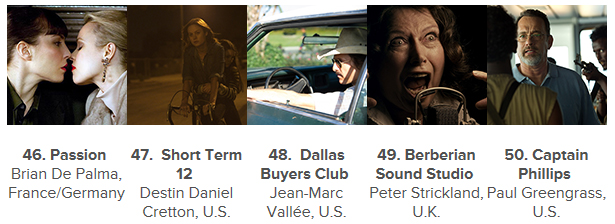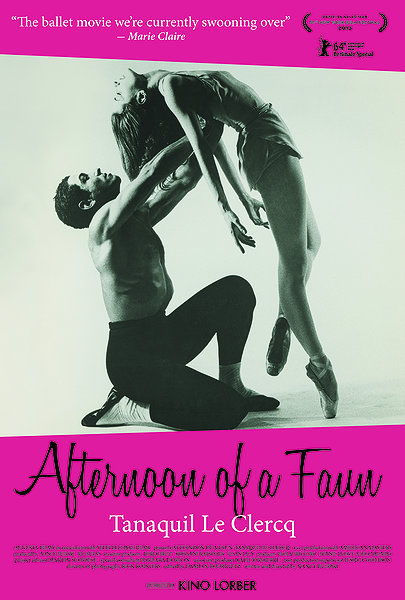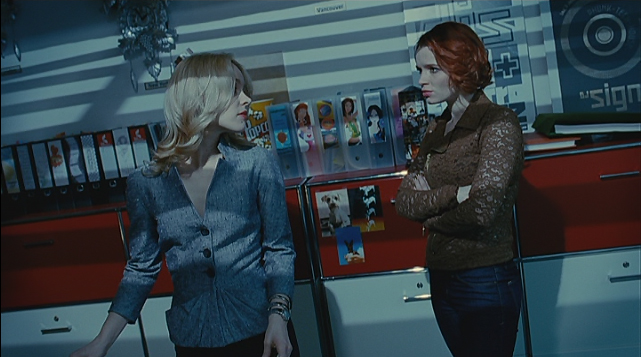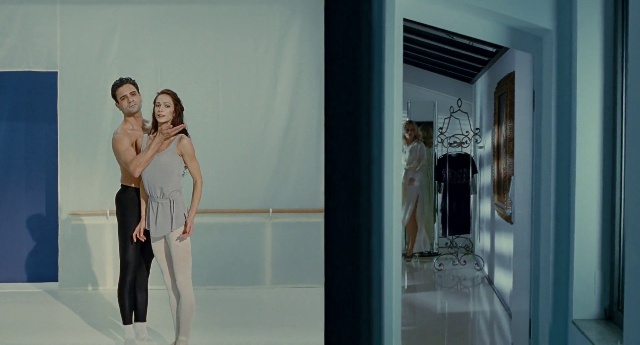
 Hello and welcome to the unofficial Brian De Palma website. Here is the latest news: |
|---|
E-mail
Geoffsongs@aol.com
-------------
Recent Headlines
a la Mod:
Listen to
Donaggio's full score
for Domino online
De Palma/Lehman
rapport at work
in Snakes
De Palma/Lehman
next novel is Terry
De Palma developing
Catch And Kill,
"a horror movie
based on real things
that have happened
in the news"
Supercut video
of De Palma's films
edited by Carl Rodrigue
Washington Post
review of Keesey book
-------------
Exclusive Passion
Interviews:
Brian De Palma
Karoline Herfurth
Leila Rozario
------------
------------
| « | February 2014 | » | ||||
| S | M | T | W | T | F | S |
| 1 | ||||||
| 2 | 3 | 4 | 5 | 6 | 7 | 8 |
| 9 | 10 | 11 | 12 | 13 | 14 | 15 |
| 16 | 17 | 18 | 19 | 20 | 21 | 22 |
| 23 | 24 | 25 | 26 | 27 | 28 | |
De Palma interviewed
in Paris 2002
De Palma discusses
The Black Dahlia 2006

Enthusiasms...
Alfred Hitchcock
The Master Of Suspense
Sergio Leone
and the Infield
Fly Rule
The Filmmaker Who
Came In From The Cold
Jim Emerson on
Greetings & Hi, Mom!
Scarface: Make Way
For The Bad Guy
Deborah Shelton
Official Web Site
Welcome to the
Offices of Death Records

1. Upstream Color
2. A Touch Of Sin
(Then alphabetical)
The Act Of Killing
Bastards
Emperor Visits The Hell
No
Passion
Spring Breakers
12 Years A Slave
Wadjda
Nathan Lee
(Contributing Editor to Film Comment)
1. Le Pont du Nord
2. "Slumber Party Alien Abduction"
(from V/H/S/2)
3. Gravity
4. Faust
5. Spring Breakers
6. The Lords Of Salem
7. Stranger By The Lake
8. The Grandmaster
9. Passion
10. Dark Skies
Previously: 'PASSION' - 2013 YEAR-END LISTS AND MENTIONS
See also: 'PASSION' ON MORE TOP 10 LISTS FROM 2013

Shaviro continues, "But Jonze does sort of (inadvertently?) display the hollowness of the aching sincerity that has come to prominence in our recent (white, liberal, well-meaning) culture as an impotent reaction formation against the hyper-cynicism of official Capitalist Realism. I vastly prefer the 'post-irony' of films like Joseph Kahn’s Detention to the non-ironic sincerity of Her; but they are both reactions against the same thing, the way that hip irony, or what Sloterdijk long ago called 'cynical reason', is the 'official' affect, as it were, of 'there-is-no-alternative' neoliberal capitalism."
Shaviro concludes, "Ultimately, Her is the exact inverse, or the flip side, of a much better film — Brian De Palma’s recent masterpiece Passion. De Palma shows the actuality of neoliberal subjectivity, in which everything is vicious competition in the service of self-entrepreneurship, with female sexuality as the linchpin of the whole structure. In contrast, Jonze shows neoliberal subjectivity’s self-deluding idealization of itself as total sincerity, maintaing this emotional nakedness and yearning within the parameters of a world in which 'sincerity' can itself only be a commodity, or a form of human capital to bring on the market. And the punchline is that even this self-congratulatory idealization is a weak and unsustainable facade. It is ultimately too hollow and sad to serve even its ideological function. Most self-delusions are self-congratulatory and even megalomaniacal; but Theodore’s self-delusion, which is also that of all the other human beings he meets (or for whom he works, writing 'handwritten' personal letters for other people) is lame, vapid, and devoid of true imaginativeness. Her — rather than The Matrix — is really the film whose motto should be, 'welcome to the desert of the real.'”
 Nancy Buirski's documentary Afternoon Of A Faun: Tanaquil Le Clercq, looks at the life of "Tanny" Le Clercq, the ballerina for whom choreographer Jerome Robbins created his staging of Afternoon Of A Faun. Brian De Palma has said he'd always been fond of Robbins' version, and adapted it as part of his latest film, Passion. The documentary premiered at the New York Film Festival last year (one year after Passion played there), and will open this Wednesday, February 5th, at Film Society Lincoln Center, and will also screen at the Berlin International Film Festival this month.
Nancy Buirski's documentary Afternoon Of A Faun: Tanaquil Le Clercq, looks at the life of "Tanny" Le Clercq, the ballerina for whom choreographer Jerome Robbins created his staging of Afternoon Of A Faun. Brian De Palma has said he'd always been fond of Robbins' version, and adapted it as part of his latest film, Passion. The documentary premiered at the New York Film Festival last year (one year after Passion played there), and will open this Wednesday, February 5th, at Film Society Lincoln Center, and will also screen at the Berlin International Film Festival this month."Buirski opens and closes her film with excerpts from the titular Debussy pas de deux, choreographed by Robbins and featuring Le Clercq and partner Jacques d’Amboise. The soft-focus kinescope footage, shot from a particularly felicitous camera angle, highlights the elegant, articulated movement, coltish grace and gestural wit that distinguished the incredibly long-legged Le Clercq from the petite, compact ballerinas that preceded her, inspiring choreographers to experiment with moves they had never before envisioned. Balanchine 'discovered' her at his School of American Ballet when she was 14 and soon shaped many of his seminal ballets around her unique talents...
"Le Clercq became Balanchine’s third wife in 1952, the revered ballet master winning out over her best friend and confidant, Robbins, whose impassioned letters to her fill the soundtrack and whose choreography for her often fills the screen. The docu’s final irony finds a tired Le Clercq postponing her Salk polio vaccine before setting off on the troupe’s European tour, fearing it might further debilitate her, then succumbing to the disease weeks later in Copenhagen."
Below is the BIFF trailer for the film, followed by a video of Buirski discussing the film on stage at the NYFF last year.
(Thanks to Rado!)

However, these aren’t just any women. These are women who have subverted their “organic” female identity to survive and thrive in the man’s world of big business. The movie opens with Christine and Isabelle sharing a drink. When they both choke on what they’re drinking, Christine laughs and says, “It’s organic!” Of course it makes them gag. Both women are synthetic products, and organic is like poison to their plastic souls. This movie is largely about the bastardization of the “organic maternal” within the economic professional sphere, about how women subvert the “maternal feminine” to attain power in the global economy. Of course they’re going to choke when they swallow something organic...
With their clothes, shoes and hyper-performed yet subverted sexuality, these women are like high-end office furniture, lamps or mirrors who reflect the environment they occupy. Their interior selves merge with the exterior of the film – the cars, fancy apartments, slick offices. Their motives are driven by interior desire, yet they are also symptoms of the exterior world. They are mere pieces within their economic environment, yet they are also symptoms of it. Their interior and exterior have become the same thing, a reflection of the economic world, a terribly ugly beautiful surface. Their professional economic environment causes the women to act how they act and molds them into what they become.
Passion is a kind of science fiction of the now narrative, a thriller about the mutation of the female cosmology when it’s placed within the global economic sphere and becomes entwined with the market and the forces of power that drive it. Sure these women are vengeful, calculating and in many ways as synthetic as their environment. They are hyper-female yet coldly economic, but they are also seething with sexuality because in De Palma’s movies (like Scarface) sex and economic power are the same thing. These women use sex to maintain their position of dominance and control. Is it attractive? On the exterior they are sexy as hell, even when they are slashing each other’s throats. On the interior, well, these gals have forfeited their interiors so that question doesn’t really matter.
Do they have choices to not be their jobs? Well, it’s not a choice that De Palma gives us. The women’s actions are motivated by artifice, and they in turn become artificial beings, with their designer clothes, executive offices, and marketing campaigns. They are like Stepford women who have graduated from the kitchen and moved into the high rise office building...
We may not be sure who is out to get who, but one thing is for sure – all these women are out to get each other one way or another as they angle for power and position. I refer to this movie as post-feminist cinema because certainly this is not an image of women that feminists would feel comfortable with, but it’s also a more accurate portrait of women in the new economy than most filmmakers would dare to create. There are multiple references to Medusa within the film – the mythic female who turns men to stone when they look at her –, but these women are already stone. It’s like a reverse parable – they have been turned to stone by gazing into and occupying the male world.
Don’t get me wrong. These women may occupy and vie for power within the male marketplace, but they do not act like men. They act like women. They look like women. But they are women from whom the maternal has been excised by economic forces. In one scene, Christine learns that one of her lovers has a daughter, and she is appalled, horrified, and disgusted . . . almost as if she’s choking on an organic drink. She just wants to get fucked. She doesn’t want to breed. The mere idea of the maternal feels like swallowing poison to her.

Adrian Martin (Goethe University)
Jealousy
Passion
You Ain't Seen Nothin' Yet
Detention
Stray Dogs
Martin also compiled the year's "Ten Best Confrontations" for Fandor's Keyframe blog, and again included Passion, writing, "One occasionally reads nonsense on the order of: 'Brian De Palma is not a director of actors.' The wonderful 'kissing confrontation' in Passion between Christine (Rachel McAdams) and her assistant’s assistant Dani (Karoline Herfurth), undoubtedly improved by the actors from what was in the script, proves otherwise: McAdams’ mock outrage as she rips her shirt open and begins to imagine her sexual harassment complaint–having just forced a kiss onto the (at this stage) helpless minion–is an hilarious expression of the power relations elsewhere expressed, in a much darker key, by the film."
Sergio Angelini (British Universities Film & Video Council)
Blue Jasmine
Broken
Hyde Park On Hudson
Passion
Rigor Mortis
"Brian De Palma refashioned Alain Corneau's Love Crimes into the criminally neglected Passion, a sly and inventive take on narcissism in the PR industry that includes a typically audacious use of split screen."
Matthew Thrift (Critic)
Norte, The End Of History
12 Years A Slave
To The Wonder
It's Such A Beautiful Day
Passion
See also: 'PASSION' ON MORE TOP 10 LISTS FROM 2013

As we transition into the new year, several 2013 year-end lists of best and worst movies have, of course, included Brian De Palma's Passion. Here are some of them:
Editors and Contributors at La Furia Umana
(No order)
To the Wonder
The Canyons
Passion
Flight
The Immigrant
Le dernier des injustes
Mille soleils
Venus in Furs
Norte, the end of History
1. Passion
2. The Immigrant
3. Stray Dogs
4. Camille Claudel 1915
5. The Canyons
6. The Master
7. In Another Country
8. Viola
9. To The Wonder
10. Before Midnight
1. Alegrías de Cadiz
2. L'inconuu du Lac
3. Spring breakers
4. Passion
5. Nobody's Daughter Haewon
6. Three Disasters
7. Les Saluds
8. Viola
9. Los ilusos
10. Mapa
1. La Bataille de Solférino
2. Inside Llewyn Davis
3. Tirez la langue, mademoiselle
4. L’Inconnu du lac
1. Gravity
2. Before Midnight
3. The World’s End
4. Fruitvale Station
5. Frances Ha
6. Spring Breakers
7. Blue is the Warmest Color
8. Passion
"Brian De Palma is back, baby! This remake of a French thriller is sleek, sexy and—of course—bonkers."
9. American Hustle
See also: 'PASSION' ON MORE TOP 10 LISTS FROM 2013
SEVERAL ESSAYS IN VARIOUS LANGUAGES NOW UP AT LA FURIA UMANA

Several essays about Brian De Palma's Passion are now available to read online at La Furia Umana . I haven't yet read them all, but I am quite taken with Sara Freeman's essay, Kisses and Dress-Up: Cinematic Cruelty in Brian De Palma's Passion . Freeman links the power struggles in Passion to the cruel and tragic high school situations in De Palma's Carrie. "Besides possibly hinting at [Passion's] very own dual identity," Freeman writes, "what at first appears to be a fun, catty back and forth between Christine and Isabel frequently turns into blatant abuse, almost like a contemporary version of Nancy Allen’s merciless treatment of Sissy Spacek’s Carrie."
Although Freeman gets the timeline of Passion wrong when she discusses three things that happen in the film back-to-back "at almost precisely the halfway point" (all three happen well before the halfway point), she does a nice job of explicating how the characters in Passion seem to exist in virtual worlds of their own individual participation. "As women who work in the advertising industry," writes Freeman, "both Christine and Isabel live for the thrill of social media acceptance and technological ingenuity. Their livelihood depends on their ability to create faces for different companies and brands and they themselves have adapted to that methodology as well. From the very first shot of Christine and Isabel sitting in front of the cold metallic screen of a Mac Book and the many computer monitor reflections and Skype video chats that follow, it’s clear that the presentation of image, realistic or not, is the most important element of the character’s lives.
"This air of virtual reality lends the film an odd sense of miscommunication because it’s almost as if each character is living inside her very own Facebook profile or twitter account. Like dress-up for grown-ups. Resembling the two other movies released this year that comment on the high school and college era’s use of social media, Spring Breakers and The Bling Ring, Passion examines how this capability has affected adult participants. Rather than take selfies of themselves smoking crack or wearing Paris Hilton’s high heels, the women in Passion remove their personalities from the equation to present their own version of the ideal contemporary career woman. They’re simply cipher cunts hiding behind the safe-guarded guise of technology, even when they appear to be talking face to face."
Earlier in the essay, Freeman discusses the importance of the clothing worn by the two main characters. "This movie is really about the clothes," states Freeman. "Clothing, the most important part of anyone's appearance, can be precisely tuned to project much in the same way a Facebook page or an Instagram feed can. Women in particular know the power clothing can have over the imaginations of their peers. In essence, Passion is a costume drama disguised as a flick about female competition and crime solving. Like any fierce cinematic bitch with a large bank account, Christine is dressed to the nine’s in designer duds and fancy make-up. She favors bold colors, sexy necklines and the most crimson and fuchsia of lipsticks. Isabel, on the other hand, is almost completely void of color and sex appeal. She wears boxy black collared shirts paired with loose slacks, blunt, Edith Head-esque bangs and a thin swish of brown eyeliner.
"Christine’s attire matches her persona perfectly – she oozes confidence, easy charm and store bought charisma. The clothes she wears are as beautiful as she is, but something’s not quite right with the whole package. Like a vulnerable little girl little girl playing dress-up to escape her abusive parents, Christine wears just a tad too much make-up, colors her hair a shade too blonde and her silky clothes just aren’t the right color or shape for her body. She’s a cheap imitation of a powerful career woman as well as an imitation of past De Palma heroines. Utilizing almost exact replicas of costumes worn by Margot Kidder in Sisters (large black hat and black circular sunglasses) and Scarlett Johansson in The Black Dahlia (‘40s style turquoise slacks and sweater), Christine treads upon the familiar territory of feminine identity in De Palma’s filmography. In those two movies, the question of individuality and the battle for uniqueness are at the center of these character’s stories – the conjoined 'twins' in Sisters fought for separate lives yet Danielle stills feels responsible for Dominique’s misdeeds and Johansson’s boring Kay struggles to be noticed by both of her police beaus after a dead girl and her lookalike steal the limelight.
"Isabel by contrast, is meek and mousy in demeanor and appearance. She is the true puppet master of the duo. With an alarmingly sincere and affected way of carrying herself, she weaves her way into and out of Christine's strange power plays with none of the reservations or lack of conviction that eventually sink Christine and her schemes... Maybe. Or maybe not. What we're left to sift through in the end is enough for a whole other essay. Perhaps the most important question lies with Isabel - When did her dual identity begin? Was it present all along? Was it constructed just to compete with Christine? To the film's credit, these questions are never answered.
"Christine and Isabel brawl for leadership and distinctiveness by using their costumes like boxing gloves. In one of the first scenes of the movie, Christine gives Isabel a chic periwinkle scarf to liven up her wardrobe. She wears it occasionally and, as I mentioned earlier, it becomes a key piece of evidence in the murder mystery. As the more obvious of the two, Christine is trying to bring Isabel down by modeling her in her image – in one scene she dresses Isabel in whore-red high heels and lipstick for a networking event knowing full-well that it would embarrass her. She also frequently kisses Isabel in an attempt to dominate her completely. Even Christine’s lipstick is venomous. It’s fascinating to watch these two characters interact with one another on screen because they move through space so differently. Isabel is seemingly the wallflower who envies Christine for her confidence and secretly wants to be her. Christine envies Isabel for her brilliance and overcompensates by being the biggest bitch possible."